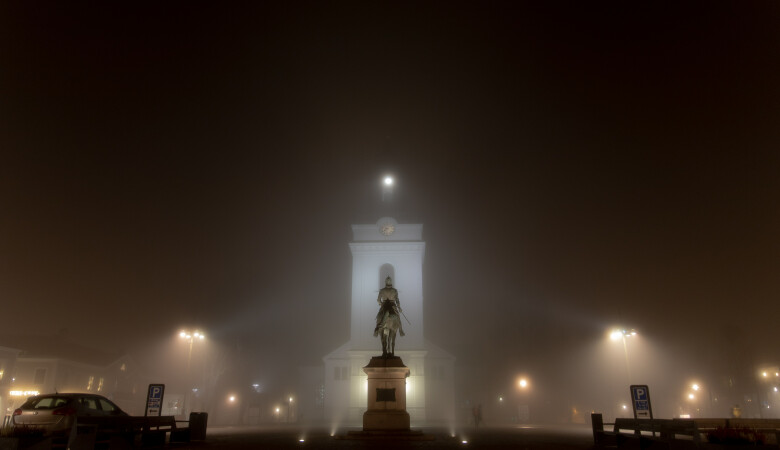The Prosecutor's Summary: The Whole World Silent Before God (Romans Sermon 15 of 120)
April 16, 2000 | Andy Davis
Romans 3:19-20
Judgment
I. Review: The Bleak Picture of Romans 1:18-3:20
Please turn in your Bibles to Romans, chapter 3. This morning we're going to be looking at verses 19-20, but also taking an opportunity to look back over this section in Paul's letter to the Romans, which we are now completing this morning. Romans 1:18 through 3:20 is a recognizable unit. And Paul has a purpose in that unit. He wants to get a very clear message across. And we're going to look back over that and get a full comprehensive understanding of that unit and it's so thrilling. It is just in the providence of God that we're here and that next week we get to turn to what I consider to be the center of the entire Bible theologically, Romans 3:21-26. If you understand Roman 3:21-26, you understand Christianity. You understand the cross, you understand the salvation that Jesus gives.
And so all of this section, Romans 1:18 through 3:20 is preparation for that, which is the glowing heart of the gospel, and I just praise God that we get to do it on Easter Sunday. But now we have the opportunity to look over these verses and to see where we've come from and where we're going. And I think it's pretty clear that Romans 1:18 through 3:20 paints a very bleak picture of the human heart, and it does so because that is the truth. There's no exaggeration in these passages, there's no rhetoric for a fact. This is the way we really are. And next week we're going to talk about justification and the thing that we have to understand about justification, is that it doesn't change us at all. It doesn't change us at all. All the things that are said of us here in Romans 3 that we talked about last week are still true at the moment of faith. It's sanctification that transforms us in reality, but justification, the change of our legal standing before God. And so if anything is said true of us here in Romans 1, Romans 2, Romans 3, we're all coming out of that, aren't we, in our Christian walk. And so it's good to know it because there's still some seeds of it in there, isn't there. There's still evidence of that sin, and we need to understand it.
Now I had a graphic picture of this whole ministry and the importance of these verses. It's funny, you say, "Well, why does Paul go on so long here on sin?" Romans 1, 2, and 3. "And why does he go into such detail? Why so much on sin?" And the picture I had occurred while I was rototilling my front lawn. Now, I needed to rototill my lawn because it hasn't had a lawn in years. The house was a rental home before that and they didn't give much attention to the lawn and it was more like, well, like concrete. Rain has washed over it and it was hard as a rock. You could bounce a basketball on it as well as on my driveway. We had extended area, although that was out of bounds. But that's the way that was and we knew that if we wanted to make a go of it and try to have a lawn, we were going to have to rent a rototiller. I actually thought of buying one and I am so glad I didn't buy one because then it would be there constantly with the opportunity for me to do rototilling. Have any of you ever rototilled?
So it's... Well, it was my first time. I rented the rototiller and when you get a rototiller and you are rototilling soil that really needs it, I mean it really needs it, what the rototiller does is that it wants to run across the surface. It just wants to take off right across the surface. And at first I let it do that thinking that's what I was supposed to do and then I realized we weren't doing anything. There were just little divots that were going across and unless I planted the grass seeds in the little divots, we weren't going to get anywhere. Next rainstorm, the grass was going to be washed all across. I realized that if I wanted to do anything, I needed to hold the rototiller in place and it needed to dig down. You see the picture? You need to take time on the issue of repentance and sin, you can't run lightly across. Jesus told the parable about this. You remember the kingdom of heaven is like a man who went out and sowed seed. You remember that? And some of the seed fell, where was the first place it fell? On that hard path. And what happened to that seed? The birds came and ate it up.
If you're going to have any kind of harvest, you got to have broken up soil, got to have broken up soil, and so the rototiller has to be held in place and we've got to dig down. We've got to break up that soil. Now, I also noticed there was another part of the yard where a member of my family wanted to plant a garden. And I went down there. I have to ask permission before using anyone and I didn't ask permission. Just a member of my family wanted to plant a garden. And I went down there to till that area and that area was very easy to till. There was already grass and a lot of things and the soil was relatively soft and it did not take long before it was all turned up. So this is a picture between somebody who's heart is really, really hard and somebody who needs a rototilling but it doesn't take as long. We're all in the spectrum there somewhere, but we all need it done, all of us. And Romans 1, 2, and 3 accomplishes that. Now let's get our bearings and try to understand where Paul has taken us to. He begins in Roman 1:16 and 17 with a summary of the whole book. He says, "I am not ashamed of the gospel because it is the power of God for the salvation of everyone who believes first for the Jew then for the Gentile."
Now, why does Paul begin by talking about the issue of shame? Because there's something about this message that makes the messenger feel like I want to hide part of it. I want to take some of it and put it away or I want to go quickly through this. Paul says I'm not going to do that because I'm not ashamed of this message. It is true. It is needful to hear this. I'm not ashamed of it because it is the power of God for the salvation of everyone who believes first for the Jew then for the Gentile. And then he goes on in verse 1:18 and following, he describes the wrath of God and the cause for the wrath God. The wrath of God is being poured out on everyone who represses the truth, who twists the truth and unrighteousness. He's talking there about primarily, I would say Gentiles, at that point, in Romans 1:23, they exchange the glory of God for an idol. They take that glory out where it was meant to be for men to live and breathe and eat and sleep and drink and do everything for the glory of God.
And yet that glory was removed and when that happened, everything changed, everything. And so there's this flood of evil at the end of chapter 1, he says they become filled with every kind of wickedness, evil, greed and depravity. They're full of envy, murder, strife, deceit and malice. They're gossips, slanderers, God haters, insolent, arrogant and boastful, they invent ways of doing evil, they disobey their parents, they're senseless, faithless, heartless, ruthless. 21 evils. And all that flows out of that exchange of the glory of God for something else, something else. And then in chapter 2 he turns his sights, he focuses on the moralist, on the person who feels, "You know, I don't need this, I'm a good person. And by the way, go for it Paul, those people, they need to hear this. Those people need to hear this preaching of righteousness so go for it, Paul." Paul says, "You are those people". There's no difference. Because you who judge someone else, you're doing the very same thing yourself. And actually, you're in more danger because you feel like you don't need the grace of God, you're basically a good person, basically alright and so you don't need the gospel of God's grace. You disqualify yourself from grace, you don't need it.
And Paul says, "Because you're showing contempt for the riches of His kindness, tolerance, and patience, you're actually storing up wrath against yourself for the day of God's wrath when His righteous judgement will be revealed." So he deals with the moralist. And then he deals with the Jew. The Jewish people who had received the law straight from God's hand, written by the finger of God, right on the tablets, come down in Moses' arms, they had received the law. And in Romans 2:23 he gives his assessment of what they had done. He said that they had dishonored God by disobeying the law. And there's a connection between honor and glory, isn't there? So they had stripped God of His glory through their disobedience, they'd done the same thing as the Gentiles. And then Paul summarizes it all as we looked at last week with an incredible collection of scriptures. Verse 9-18 says, "What shall we conclude then, are we any better? Not at all, we have already made the charge that Jews and Gentiles alike are all under sin as it is written. There is no one righteous, not even one. There is no one who understands, no one who seeks God, all have turned away, they have together become worthless, there is no one who does good. No, not one."
II. Why So Much on Sin?
And so Paul assesses all of us, Jew and Gentile alike, as in need, equally in need, of the grace of God. And now as a prosecuting attorney finishes up or summarizes his case, he finishes it up here in verse 19-20. "Now, we know that whatever the law says, it says to those who are under the law so that every mouth may be silenced and the whole world held accountable to God. Therefore no one will be declared righteous in His sight or justified by observing the law, rather, through the law we become conscious of sin." And so we've been describing why Paul spent so much time on sin. And I think we understand, it's not just a matter of the rototiller. It's got to do with the very basic nature of salvation and the basic nature of the human heart. Now, what is the true nature of salvation? If you were to ask an apostle, "What must I do to be saved?" What answer would they give? "What you need to do is you need to get up and walk the aisle at a certain time and sign a card and pray a prayer. That's what you need to do to be saved." Is that what they would say? No. They would say, "Repent and believe the good news." Well, Jesus was the first one that said that. In Mark 1:15, it said, "Repent and believe the Gospel." Repent and believe the Gospel. So I want to say not just believe, repent and believe, repent and believe.
And Paul had just said in Romans 2:4, the kindness of God leads you toward what? What is God leading you toward? Repentance, repentance. Turning away. Now, modern evangelism, in my opinion, looks a lot like that rototiller when I first started using it. Dancing lightly across the top very quickly. Oh yeah, it's all the sin to fall short of the glory of God. And then, okay, we got the sin in there. We're done with that, quick message and then we move on quickly. And in this way, I think there's a problem in that they're dealing lightly with sin just like the false prophets. Jeremiah 6:13-14, "Prophets and priests alike, all practice deceit, they dressed the wound of my people lightly." As we talked about last week, peace, peace they say, when there is no peace. Brothers and sisters, there is a peace. Therefore, since we have been justified through faith, we have peace with God through our Lord Jesus Christ. There is a peace, but not that way, not that way. Repentance and faith. And without brokenness over sin, there's no repentance. There's no repentance unless you take the time to feel it. Unless there's a brokenness, unless there's a humble and contrite spirit which you will not despise oh God. It's the only safe place to be. "Blessed are the spiritual beggars, blessed are those who mourn. Blessed are the meek." Remember that?
The brokenness that the word of God presents. True gospel ministry always produces grief over sin. There's a grieving moment. James wrote of that in James 4:8-10, "Come near to God and He will come near to you. Wash your hands you sinners, purify your hearts you double minded. Grieve, mourn and wail. Change your laughter to mourning and your joy to gloom. Humble yourselves before the Lord and He will lift you up." That's the order, repent and believe. Repent and believe. I think when I'm under the word and when I feel myself as I am under sin and the word comes and convicts me, I feel another thing. Not just grief over sin, I feel anger at sin itself. I feel like if sin were a body, if it had a neck, I'd go choke it immediately. I want it out of my life. I hate it. I want to kill it. That's a good place to be, we're not supposed to deal lightly with these things. We're supposed to be vigorous. And so Paul is thorough, he wants a true dealing with sin and he wants to take the time and he wants repentance, because he wants a total turning away from sin.
Last week I told you there's no one who seeks God, but when the Holy Spirit starts to work on you, then you seek God, you see. You start to get hungry, you're seeking. And at that point Isaiah 55:6-7 kicks in. There it says, "Seek the Lord while he may be found. Call on him while he is near. Let the wicked forsake his way and the evil man his thoughts. Let him turn to the Lord. Let him turn to the Lord and he will have mercy on him and to our God for he will freely pardon." Those are great verses on repentance. We're turning away from something and we're turning to something. We're turning away, it says here, "The wicked must forsake his way." What is the way that's forsaken? It's the way you live your life. It's the everyday things that you do, the decisions that you make everyday. And the evil man has to turn away from his thoughts. I tend to think of this in terms of idolatry, that we have false ideas about God. We're going to turn away from our evil way, we're going to turn away from our idolatries thought, and we're going to turn to the Lord as he presents himself in scripture and he will forgive. He will freely pardon lavishly, completely.
And so, therefore, the true nature of salvation demands a deep dealing with sin. So also does the true nature of the human heart. What is our heart like? What's the nature of the human heart? Well, I guess you would say that depends on the person. If the person is basically a good person, then they have basically a good heart. They dabble in sin from time to time, but then they return to their true center, which is to do good deeds for people. But is that what the scripture says about the nature of our heart? Is that where we start? Jeremiah 17:9 says, "The heart is deceitful above all things and beyond cure. Who can understand it?" A deceitful person is one who is tricky, like a con artist. Shading and shifting and twisting the truth, that's what the heart does. And what is the heart looking for? Evasion of responsibility for sin. It isn't me, I'm not like that. That's the way the human heart is.
Proverbs talks about this. Proverbs 5:6 refers in this case to the adulterous. "The adulterous gives no thoughts to the way of her life. Her paths are crooked, but she knows it not." Think about that. She doesn't give any thought to the way of her life, her paths are crooked but she doesn't even know it. Why doesn't she know that her paths are crooked? Because of the deceitfulness of the heart. And then this one, Proverbs 30:20, "This is the way of an adulterous. She eats and wipes her mouth and says, 'I've done nothing wrong.'" I've done nothing wrong.
Recently, I was reading about a study done by some Roman Catholic scholars, they were looking at the gradual disuse of the confessional. Now in the Catholic faith, a confessional is a place where you go and you sit and you, either face to face with the priest or through a partition, you are confessing your sin. Protestants don't do this, or this part of the Catholic heritage, but it's following into more and more disuse. People just aren't coming anymore to the confessional. Whereas, they continue to come to the Lord's Supper, to the communion service, in about the same rate. And so they're wondering, what is the cause of this? And one of the avenues of research they did was at Catholic colleges, and they're starting to talk to people. And they talked to a Catholic ethics professor who had Catholic students, college students. And they were dealing with ethics, right and wrong, wrestling with things like this. And the students were asked to write an essay anonymously, typed, no handwriting, anonymous essay on a struggle with right and wrong that they've had in their own life recently, where they really wrestled with an issue of right and wrong.
And the professor said to the researcher, "You know, more than half of the students contacted me and said that they couldn't complete the assignment, because they didn't know of anything that they've done wrong." They just weren't aware of anything that they've done wrong. Well, it's not just the Catholic church, this is spreading, this is all over. People have no deep sense of conviction over sin. And why? Because they move quickly through these things. The nature of the human heart demands a thorough treatment with sin.
III. Paul’s Closing Statement: The Prosecutor Rests His Case
And so Paul comes to his closing statement. And in verse 19-20, there are four half-verses, four statements that he makes. Verse 19 has two halves and verse 20 has two halves. Verse 19 says, "Now we know that whatever the law says, it says for those who are under the law." That's the first half. Step one, the law speaks to the Jews. Who are under the law? The Jews are. Step two, the result of the speaking to the Jews is that the whole world, "every mouth may be silenced and the whole world held accountable to God." That's step two. Step three, first half of verse 20, it says, "Therefore no one will be justified," really is the best translation there. "No one will be justified by works of the law." And then step four, "For through the law, comes a knowledge of sin." In order to understand it, let's start with the final statement, "Through the law comes the knowledge of sin."
Now how is it that the law gives the knowledge of sin. Some commentators say that the way that it functions, the way that the law gives a knowledge of sin, is that it instructs us what sin is. It tells us when you read the Ten Commandments or any of the laws from God, you learn what sin is. "You shall not murder." Okay, murder is sin. "You shall not commit adultery," therefore adultery is sin like this. So it's an education. It's a matter of education. The problem is, that that doesn't fit into the train of thought here at all.
Let's read it this way, "By works of the law, no person shall be justified in God's sight." Why? Because the law educates us as to what sin is. Does that fit? Is that why none of us will be justified? I'm not going to be justified by the law because I know that murdering is wrong. That doesn't make any sense at all. Alright, then what does the verse mean? Better, I think, "Through the law comes the knowledge of sin," is not that it educates us what sin is, it educates us where sin is. In here. It shows us that it's inside us, and therefore, the outside, the external application of the law, is never going to justify us. It only ever produces more sin.
When you take an unregenerate heart, somebody who's not saved, and bring the law in there, it promotes sin rather than obedience. Paul gets to this in Romans 7, "What then shall we say? Is the law sin? Certainly not! For I would not have known what sin was except through the law. For I would not have known what coveting really was if the law had not said, 'Do not covet.' But sin, seizing the opportunity afforded by the commandment, produced in me every kind of covetous desire. For apart from the law, sin is dead." In other words, Paul said, "I had covetousness inside, but it wasn't till the command came that I got a chance to express it."
Let me give you an illustration. Let's say that there's a teenager. And the mail comes, and the teenager looks down the driveway, and the mail has been delivered. And the teenager goes down there and gets a stack of mail and starts to walk back to the house going through it. What is the teenager looking for? Something for him or her, right? Maybe a personal letter, a postcard, something interesting. "Bills, bills, bills. Uh-oh, wait a minute. Here's something." And it's from the school where the teenager goes. And it says on it, 'For parents only.' For parents only. Okay, this is a moment of temptation, isn't it? Where did the temptation come from? It came from the law.
Do you understand? You see how it works? That person was just moving free through life, getting the mail, looking for a letter from a friend, and all of a sudden, the commandment came. And sin sprang to life. Now, I'm not going to tell you whether he or she opened the letter. I don't really know. But you see how it works. Let me ask a question, would it have helped if it said, 'For parents only. Teenagers absolutely forbidden to open this'? Would that have helped? What do you think? 'On pain of death.' Would that have helped? What words would you put on there so that sin would be reduced?
Do you see how it works? There's nothing wrong with the command, but there's something wrong with us. We want to disobey, and then when the commandment comes, sin responds to it. Sometimes we give in, sometimes we don't. But this is what Paul means when he says, "Through works of the law, no one will be justified," because of the way that sin affects the human heart. It doesn't work that way. "The sinful mind," says Paul, "is hostile to God. It does not submit to God's law nor can it do so." Law shows us what sin is and shows us where it is and how serious it is.
And therefore, no one will be justified by observing the law. I'm moving backwards to the beginning of Verse 20. No one will be justified by observing the law. You will not stand on judgement day and say, "Because of all the commands, God, you gave me, I am righteous. I'm righteous." No, you won't. Because of the commands, you will have a huge pile of sin to account for. And if it's not covered by the blood of Christ, you'll have no answer. The whole world will be covering its mouth at that time. That's how the whole thing works here. Law cannot bring righteousness.
Now, there are two proofs of this, two great proofs in Scripture. Proof number one is the history of the Jewish people. Did law bring righteousness to the Jews? Did it? They had lots of time with it, 15 centuries. Did it produce righteousness in them? Proof number one. Galatians 3:21-22 covers this, "If a law had been given that could impart life, then righteousness would certainly have come through the law." There was plenty of time if that's what the law was given for, there was plenty of opportunity for righteousness to have come that way.
Proof number two that justification will never be by works of the law is the fact that God sent His Son, Jesus, to die violently on the cross. Galatians speaks to that too. Galatians 2:21 says, "I do not set aside the grace of God, for if righteousness could be gained through the law, Christ died for nothing." Do you think that Jesus came to suffer and die on the cross to provide a second way for us to get to heaven? Or a 10th way? Or a 20th way? No, he came to provide the only way. And therefore, it's worth doing. Righteousness will not be a way to heaven, or law will not.
Now, let's pick up on the Jews. It says at the beginning in Verse 19, "We know that whatever the law says, it says for those who are under the law." Who is that? It's the Jews. Now, God gave the law to the Jews. And then God waited patiently to see what the Jews would do with the law. Let's go back in time to the moment when God gave the law to the Jews. You remember that day? Mount Sinai? Moses was up there receiving the law. What were the Jewish people doing down at the base of the mountain? They were exchanging the glory of God for an image. You remember that? Trading the glory of God for an image. The day the law came the Jews made a golden calf. Shortly thereafter the Jews rebelled against God's clear command, they would not go into the Promised Land, they said, "Let's choose our leaders and go back to Egypt." They rebelled. And so for 40 years, they had to wait for that generation to die because of their disobedience to the law.
Okay, the time came, the generation had died off. It was time now to enter the Promised Land, under Joshua. God gave them a clear command, "Now listen, Jericho is Mine. Everything in Jericho is Mine. You don't take a gold coin, you don't take a silver coin. You don't take a handkerchief. It's all Mine." Did they obey? No. Achan saw a nice looking Babylonian robe, grabbed it, took a wedge of gold, disobeyed.
Alright, well, after that was dealt with, then they moved through and they conquered the Promised Land. Did they conquer it totally, just as God had commanded? Did they drive out all those people from the... Did they conquer it totally? No, they did not. Through lack of faith, they did not conquer the whole Promised Land. And God had told them, "Those people will be a snare to you, a stumbling block. They will lead you into sin." Did they? Yes, they did. The people were led into idolatry. And so one judge after another came in, and the people had to be trained out of their rebellion consistently, and then came the kings. Ah, a new phase of Israel's history. Maybe now, righteousness will come by the law. Maybe if we have a good king. Did that happen? No, one king after another disobeyed, one king after another led Israel into idolatry. Do you see the picture? A full history of rebellion, acted out in space and time and recorded in scripture. The Jews did not become righteous by the law.
Alright, well then you say to yourself, "Okay. Well, wait a minute. That was the Jews. See I'm from Irish roots. You know if they'd been Irish, it would have been different. Alright?" Or no, you're thinking, "Well, I'm not an Irish. If it had been my group, we would have done better with the law." Is that true? If it had been a different ethnic group, would the law have worked better? No, the Jews were chosen out because there was nothing all that distinct about them and they were put on a stage and the law was acted out in 15 centuries of history, to show that righteousness would not come by the law. Would we have done any better? No. It says in Romans 3:22, there is no difference. "For all have sinned, and lack the glory of God." There's no difference and you wouldn't have done any better.
And so that's the first thing. And what is the conclusion? How does the prosecutor finish second half of verse 19? He says, "So that every mouth may be silenced and the whole world held accountable to God." The whole world lived through Israel, the whole world sinned to some degree through Israel, the whole world disobeyed the law through Israel. And what does that mean? The whole, "Every mouth may be silenced"? This is the silence of judgment day. And why silence? It works this way. Romans 2:2 says, "Now we know that God's judgment against those who do such things is based on truth." We're silenced because it's true. We stand there on judgment day and it's all true, every word of it. And it's kind of a stunned silence. Revelation 8:1, it said, "When He opened the seven seal, there was silence in heaven for about half an hour." Judgment day will be a ton of silence. Nobody will be able to answer back to God. Job said it, he said, "Indeed I know this is true, but how can a mortal be righteous before God? The one wish to dispute with Him, you could not answer Him one time, out of a thousand." Is the world silent now before God, or is there murmuring about this doctrine? Is there murmuring in the heart? "That's not me, I'm righteous. I don't need that", murmuring. On that day every mouth will be silenced, and the whole world accountable to God.
When Peter preached like this on the day of Pentecost, God by the Holy Spirit took the Word and penetrated that hard heart. Penetrated the hearts of his Jewish brothers, penetrated their hearts. And they cried out from that penetration, they cried out from that conviction. "Brothers what shall we do, what shall we do?"
IV. “Brothers, what shall we do?”
In order to answer that question, you have to understand what has been removed, what has been removed by this three chapters of dealing with sin. Number one, confidence that judgment day will be a slight affair. Judgment day will not be a slight or a light affair. Romans 2:16 says, "On that day, God will judge men's secrets through Jesus Christ." Secondly what has removed confidence and self-righteousness. Romans 3:9, "There is no one righteous, not even one." And number three, confidence in human efforts to attain righteousness. "No one will be justified by works of the law." And number four, confidence in my basic judgment. "There is no one who does good, not even one." All of those things are removed. And the effect is exactly what happened when Job saw God. Job 40:4, he said "I'm unworthy. I am unworthy, how can I reply to you? I put my hand over my mouth." The Word just silences us and we're ready for grace. We're like my yard was after I Rototill-ed for four hours, broken up, ready for that grass seed, ready for the seed, broken up and ready to listen.
Brothers, what should we do? Repent and believe. Personal faith in Christ. What remains? What remains is mercy, mercy. Everyone on judgment day will either be condemned justly, or saved mercifully. What's left is mercy, and we all need it. Roman's 11:32. It says that God has bound all men over to disobedience in order that He may have mercy on them all. I guess what I've asked you is, do you feel like you need mercy? Do you feel like you need the grace of God? If so, God's Word has had its way with you. Your mouth is silent. You're quiet before Him. You live in repentance and in humility and brokenness of heart. In that way, the Word of God has broken up the soil of your heart and a good harvest can come. But if you're fighting it, if you're resisting, if you're kicking, then no harvest will come. There will be no righteousness on judgment day. All of us need justification by faith, justification by grace alone. And that is the very point that Paul's been making for three chapters. Let's close in prayer.






























